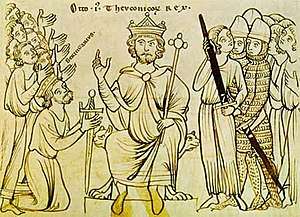952
Year 952 (CMLII) was a leap year starting on Thursday (link will display the full calendar) of the Julian calendar.
| Millennium: | 1st millennium |
|---|---|
| Centuries: | |
| Decades: | |
| Years: |
|
| 952 by topic |
|---|
| Leaders |
| Categories |
|
| Gregorian calendar | 952 CMLII |
| Ab urbe condita | 1705 |
| Armenian calendar | 401 ԹՎ ՆԱ |
| Assyrian calendar | 5702 |
| Balinese saka calendar | 873–874 |
| Bengali calendar | 359 |
| Berber calendar | 1902 |
| Buddhist calendar | 1496 |
| Burmese calendar | 314 |
| Byzantine calendar | 6460–6461 |
| Chinese calendar | 辛亥年 (Metal Pig) 3648 or 3588 — to — 壬子年 (Water Rat) 3649 or 3589 |
| Coptic calendar | 668–669 |
| Discordian calendar | 2118 |
| Ethiopian calendar | 944–945 |
| Hebrew calendar | 4712–4713 |
| Hindu calendars | |
| - Vikram Samvat | 1008–1009 |
| - Shaka Samvat | 873–874 |
| - Kali Yuga | 4052–4053 |
| Holocene calendar | 10952 |
| Iranian calendar | 330–331 |
| Islamic calendar | 340–341 |
| Japanese calendar | Tenryaku 6 (天暦6年) |
| Javanese calendar | 852–853 |
| Julian calendar | 952 CMLII |
| Korean calendar | 3285 |
| Minguo calendar | 960 before ROC 民前960年 |
| Nanakshahi calendar | −516 |
| Seleucid era | 1263/1264 AG |
| Thai solar calendar | 1494–1495 |
| Tibetan calendar | 阴金猪年 (female Iron-Pig) 1078 or 697 or −75 — to — 阳水鼠年 (male Water-Rat) 1079 or 698 or −74 |

Berengar of Ivrea (left) bows to Otto I.
Events
By place
Europe
- Summer – At the Reichstag in Augsburg (assembled by King Otto I), joined by German nobles and bishops, Berengar of Ivrea pays homage. He becomes a vassal of the East Frankish Kingdom. Otto leaves a strong garrison at Pavia in the hands of his son-in-law Conrad the Red, duke of Lotharingia.[1]
Scotland
- King Constantine II dies at the monastery of St. Andrews (where he has been retired since 943). His cousin and ruling monarch, Malcolm I, fights a battle against the Northmen or the Norse–Gaels.[2]
Africa
- Summer – Kalbid forces under Al-Hasan ibn Ali al-Kalbi (an aristocratic member of the ruling Fatimid Caliphate) sail from Sicily and invade Byzantine Calabria. He attacks several towns, including Gerace and Cassono.
Births
- Adelaide of Aquitaine, French queen consort (or 945)
- Adela of Hamaland, Frankish countess and regent (d. 1021)
- Fakhr al-Dawla, emir of Gurgan and Tabaristan (d. 997)
- Sa'd al-Dawla, Hamdanid emir of Aleppo (d. 991)
- Song, Chinese empress consort (d. 995)
Deaths
- June 15 – Murong Yanchao, Chinese general
- July 17 – Wu Hanyue, Chinese noblewoman (b. 913)
- September 6 – Suzaku, emperor of Japan (b. 923)
- September 10 – Gao Xingzhou, Chinese general (b. 885)
- December 17 – Hugh the Black, duke of Burgundy [3]
- date unknown
- Alan II (Wrybeard), duke of Brittany
- Constantine II, king of Alba (Scotland)[4]
- Li Jianxun, Chinese official and chancellor
- Mansur ibn Qara-Tegin, Samanid governor
gollark: APIONET is eternal.
gollark: > see i wanna beat someone up but i dont want to start a fight soJust become a bully and beat up those weaker than you!
gollark: Do boxing?]
gollark: VM ethernet platform hacked.
gollark: Synthesizing UDP unicode microchip...
References
- Timothy Reuter (1999). The New Cambridge Medieval History, Volume III, p. 247. ISBN 978-0-521-36447-8.
- Early Sources, p. 451. The corresponding entry in the Annals of the Four Masters, 950, states that the Northmen were the victors, which would suggest that it should be associated with Eric Bloodaxe.
- Hugues le Noir sur le site de la Fondation pour la généalogie médiévale (in French)
- Lynch, Michael (ed.). The Oxford companion to Scottish history. Oxford University Press. p. 106. ISBN 9780199693054.
This article is issued from Wikipedia. The text is licensed under Creative Commons - Attribution - Sharealike. Additional terms may apply for the media files.